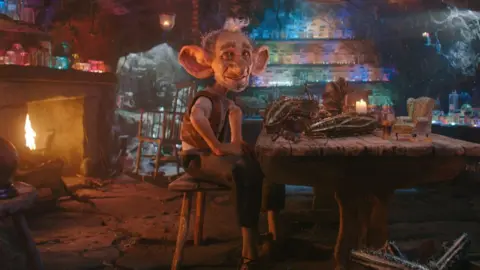
 John Lewis
John Lewis
The festive season is getting under way again, and so too is the battle of the Christmas adverts.
John Lewis has become the latest retailer to beam its festive message into UK homes.
The advert, released on Thursday, is a whimsical journey through one woman’s memories as she tries to find the perfect Christmas gift for her sister.
Set to Richard Ashcroft’s 1990s track Sonnet, the ad is a “real tear-jerker” and suggests the retailer wanted to “return to its roots”, analysts said.
“Most of this year’s festive adverts have fun at their heart – gnomes taking over Asda, a mystery whodunit at Waitrose, the welcome return of Kevin the Carrot at Aldi,” said retail expert Catherine Shuttleworth.
But John Lewis has hit a “more traditional” feel, she added, after last year’s advert proved divisive.
Its 2023 commercial featured a giant Venus flytrap. It left some viewers perplexed, as they questioned what a bloodthirsty plant had to do with Christmas.

 John Lewis
John Lewis
In this year’s John Lewis advert, the heroine, Sally, is seen frantically doing last-minute shopping for her sister.
She falls through a rack of dresses and finds herself in a fantastical world, where she revisits moments in her life – from childhood through to teenage years and adulthood.
There are no recognisable celebrities in the advert, something Charlotte Lock, customer director at John Lewis, told the BBC was deliberate.
“We get contacted every year by A-listers who want to be in our ad,” she said.
“We always have the conversation, but what we didn’t want was that celebrity to overtake the story.”
- Pub ‘blown away’ by Christmas ad response
- Shoppers welcome ditching of Christmas ad – expert
- Festive German ad featuring schoolgirl goes viral
It’s still only mid-November, but the John Lewis advert is one of the last Christmas adverts to be released.
For retailers, capturing the mood of the nation is always a challenge, especially given that the ads are planned months in advance.
Ms Lock said they felt people wanted “a bit of emotion and sentimentality” after “a tough year, with global conflict and an economic crisis”.
“The cost of living is still on people’s minds, and people are concerned about the cost of Christmas,” she said.
“It feels like there’s a nation that’s quite exhausted and actually has been waiting to celebrate, and Christmas is a great outlet for that,” she added.

 Aldi
Aldi
Elsewhere, many brands have taken a lighthearted approach.
“Humour and fun are a good way to raise spirits after what has been a difficult year in the world,” Ms Shuttleworth said. “So you can see why retailers have taken that route.”
Aldi has brought back Kevin the Carrot for his ninth consecutive year.
Joined by his wife Katie, he plunges into another assignment, as he tries to get the “spirit of Christmas” back from the dastardly humbugs.
Meanwhile, Asda’s festive advert features a team of garden gnomes who rise up from the snow to save Christmas.

 M&S
M&S
Marks and Spencer has also opted for tried-and-tested themes. Its food advert sees the return of Dawn French as a festive fairy, and she also appears as herself.
The first of the six-part ad series sees an exhausted French on her way home, complaining about how much she has to do.
The fairy then pops up and offers a helping hand, transforming French’s house, making it ready for a Christmas party with mountains of festive food.

 Morrisons
Morrisons
Morrisons’ singing oven gloves are also back, as the supermarket puts the focus on those hosting the Christmas meal.
The advert is set to Give a Little Love from the film Bugsy Malone, with the soundtrack sung by a choir of Morrisons staff.
Argos has also gone for the same characters as last year – cartoon duo Connie the doll and Trevor the dinosaur.
The decision to use familiar ideas and characters is a smart one, said Lynne Deason, head of creative excellence at analysts Kantar.
“Consistency pays in advertising,” she said. “Sticking with the same creative approach often makes it easier for people to know which brand is being advertised.
“It can build a sense of nostalgia too, adding to the entertainment factor.”
Famous faces

 Waitrose
Waitrose
While John Lewis shunned celebrities, some other adverts are fronted by famous faces.
Its Waitrose supermarkets has a whodunit two-parter which leaves audiences on a cliffhanger, starring Succession’s Matthew Macfadyen as a detective on the hunt to uncover who has stolen the family’s red velvet cake.
Elsewhere, Greggs has enlisted Nigella Lawson to star in its first ever Christmas advert.
The TV chef declares it is her “favourite time of year” before tucking into festive bakes.
Opinion was divided on social media, with one X user saying the advert had combined “Nigella and Greggs, two of the greatest loves of my life”.
But another questioned whether they were living in a “weird parallel universe”, adding: “Is this a really early April Fool?”

 Sainsbury’s
Sainsbury’s
Other retailers have gone with famous animated characters.
Sainsbury’s was quick off the mark with its advert, which features beloved Roald Dahl character the Big Friendly Giant (BFG).
We see the BFG asking the supermarket to make his Christmas “a big more phizz-whizzing”.

 Lidl
Lidl
Meanwhile, Lidl – like John Lewis – has gone for a classic tale designed to tug at the heartstrings.
It depicts a girl who decides to send a present to a boy who is feeling lonely, a nod to the retailer’s toy bank scheme.
There’s no mistaking the message of goodwill, as a voiceover encourages viewers to “think big”, but also asks: “Is it not more Christmassy to give?”
Tesco’s advert features a man called Gary who is trying to celebrate Christmas while mourning his grandmother. The melancholy ad sees Gary continuing a tradition they shared, building a gingerbread house as his way to remember her.
Amazon has also opted for the theme of kindness, telling the story of a theatre caretaker whose hidden singing talent is discovered by his colleagues.
They encourage the janitor to go on stage, where he performs What the World Needs Now Is Love.
‘It’s part of the Christmas countdown’
Taken as a whole, advertisers are set to spend a record £10.5bn this festive season, according to the Advertising Association and World Advertising Research Centre.
John Lewis, for its part, doesn’t disclose how much it spends on its Christmas advert, but Ms Lock admitted it was “incredibly important commercially”.
Whether the money pays off is hard to tell, but experts say it’s about more than just getting consumers through the doors.
“Adverts have become part of the ritual surrounding Christmas,” Prof Helen Wheatley, a historian of television, told BBC News.
“The tradition continues, partly because it’s an absolutely prime time for retailers to be speaking to potential consumers,” she said. “And partly because it’s entrenched and it’s something they’ve always done.”
Prof Wheatley pointed out that while we think of them as “Christmas TV adverts”, they are now also huge online moments, with the ads being shared widely on social media.
But she said that some things don’t change – with retailers keen to conjure up a sense of cosiness and familiarity.
“It’s a moment where the nation comes together,” she added.
“We know people get quite excited about the festive adverts. It’s a marker in people’s years and has become part of that Christmas countdown.”








